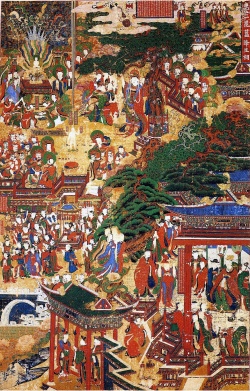Difference between revisions of "Eight Scenes of the Life of the Buddha"
Jump to navigation
Jump to search
| Line 1: | Line 1: | ||
| + | [[File:2sang.jpg|thumb|250px|]] | ||
<poem> | <poem> | ||
| − | Paintings of the eight scenes of the | + | Paintings of the [[eight scenes of the Life of Buddha]] can be found in the [[Palsong-jon]], the [[Eight Pictures Hall]], or on the outside walls of the Main Hall of [[Buddhist]] [[Temples]]. When inside, they are skillfully artistic and colorful as well as quite complex. In addition to the specific episodes, associated ones are shown and the back-ground of the scene is elaborated. When on the outside walls, they are of simple design in a more {{Wiki|naive}} style. |
| + | |||
In either case, there are eight clues by which each can be identified: | In either case, there are eight clues by which each can be identified: | ||
Latest revision as of 05:54, 6 February 2015
Paintings of the eight scenes of the Life of Buddha can be found in the Palsong-jon, the Eight Pictures Hall, or on the outside walls of the Main Hall of Buddhist Temples. When inside, they are skillfully artistic and colorful as well as quite complex. In addition to the specific episodes, associated ones are shown and the back-ground of the scene is elaborated. When on the outside walls, they are of simple design in a more naive style.
In either case, there are eight clues by which each can be identified:
1) elephant;
2) baby; (
3) sick or dead man;
4) white horse over a wall;
5) starved figure;
6) tempters;
7) Halo;
8) bier.
